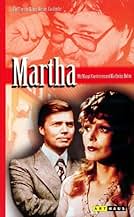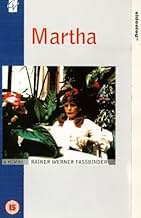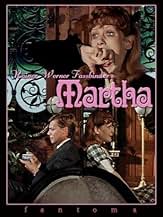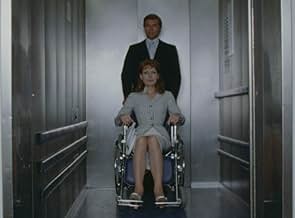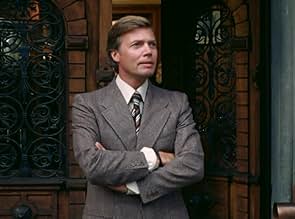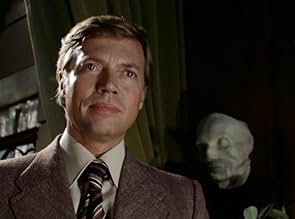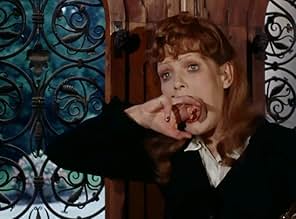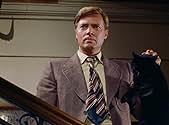IMDb-BEWERTUNG
7,5/10
3195
IHRE BEWERTUNG
Auf einer Reise nach Rom begegnet Martha Helmut, den sie einige Zeit später in Deutschland heiratet. Doch schon bald leidet sie unter den zunehmend perversen Machtspielchen ihres Ehemannes.Auf einer Reise nach Rom begegnet Martha Helmut, den sie einige Zeit später in Deutschland heiratet. Doch schon bald leidet sie unter den zunehmend perversen Machtspielchen ihres Ehemannes.Auf einer Reise nach Rom begegnet Martha Helmut, den sie einige Zeit später in Deutschland heiratet. Doch schon bald leidet sie unter den zunehmend perversen Machtspielchen ihres Ehemannes.
- Regie
- Drehbuch
- Hauptbesetzung
- Auszeichnungen
- 1 Gewinn & 1 Nominierung insgesamt
Michael Ballhaus
- Restaurant guest flirting with Martha
- (Nicht genannt)
Peter Berling
- Taxi Driver
- (Nicht genannt)
Empfohlene Bewertungen
Two days ago I have seen this movie. Lead actor Karlheinz Boehm and famous filmmaker Volker Schloendorff were present in the audience, and then discussed it after the screening. This was part of (or spontaneously turned into) a fund-raising effort for the humanitarian organization that K.H. Boehm founded.
Boehm said that Fassbinder was an expert or at least naturally gifted in judging people. In the discussion it was also mentioned that in his theater group at that time he had also built a network of dependencies. Boehm was very impressed by a quote from Fassbinder, saying approximately: In general you have to exaggerate something to unleash the full power and achieve maximum artistic effect, however it is important to do it correctly (do not exaggerate too much). Here this principle has been applied to demonstrate the (one-sided) struggle for power and dominance in a marriage. At the beginning the husband is very male, that is outspoken, direct, almost blunt. Martha seems to be in love for quite a while. Later, the requests of the dominant, violent husband become increasingly over the top, so that watching the sadist makes you feel uneasy. The same holds for Marthas friends and relatives which are unable to help or, with the exception of Herr Kaiser, even realize the truth about Marthas personality being gradually ruined. This is criticism of an emotionally degraded society.
However, from a aesthetic standpoint, camera and light are marvelous. The set locations (typical for wealthy people) have also been carefully selected and are amazing in their false, pompous colorfulness. In places, there is also quite a bit of black humor mixed in, and at the beginning it seemed like a mystery story (the black guy chasing Martha)or a love story.
Aside from that , the movie also reminded me of a 1950s Bergman marriage movie. Worth seeing.
Boehm said that Fassbinder was an expert or at least naturally gifted in judging people. In the discussion it was also mentioned that in his theater group at that time he had also built a network of dependencies. Boehm was very impressed by a quote from Fassbinder, saying approximately: In general you have to exaggerate something to unleash the full power and achieve maximum artistic effect, however it is important to do it correctly (do not exaggerate too much). Here this principle has been applied to demonstrate the (one-sided) struggle for power and dominance in a marriage. At the beginning the husband is very male, that is outspoken, direct, almost blunt. Martha seems to be in love for quite a while. Later, the requests of the dominant, violent husband become increasingly over the top, so that watching the sadist makes you feel uneasy. The same holds for Marthas friends and relatives which are unable to help or, with the exception of Herr Kaiser, even realize the truth about Marthas personality being gradually ruined. This is criticism of an emotionally degraded society.
However, from a aesthetic standpoint, camera and light are marvelous. The set locations (typical for wealthy people) have also been carefully selected and are amazing in their false, pompous colorfulness. In places, there is also quite a bit of black humor mixed in, and at the beginning it seemed like a mystery story (the black guy chasing Martha)or a love story.
Aside from that , the movie also reminded me of a 1950s Bergman marriage movie. Worth seeing.
A great movie, made in a special way. Not only was it made for TV, it has the style of a soap-opera. Those who have seen it must have noticed that there are a number of "episodes", separated by a gradual darkening of the screen (till completely black, then lightening up again). The acting, the decor and so on are pure soap-opera. Some reviewers have seen a touch or two of Douglas Sirk, but there's more than that to it: when Martha gives her German address in the embassy, the name of the street is "Douglas Sirk"! Pure melodrama, but with great results. Fassbinder gives the movie the necessary pace to portray a convincing tragedy resulting from fatality mixed with individual characteristics. The final words appropriately are "When God takes a step, man cannot change it".
I was so amazed by this genius, the way that Fassbinder holds his camera as if it was his own child. I've rarely seen somebody mastering the art of camera as much as Fassbinder does. He's all over it, he sees beyond the human eye. The shot where Martha meets Helmuth for the first time in Roma is amazing... my heart stopped for about 3 seconds... I couldn't believe what I just saw...I saw this shot many times but I was afraid that I might loose interest in it if I kept playing it again and again. But I didn't. As for the story, it is very beautiful indeed, strange and disturbing. It's one of the best filmed movie ever done in my opinion. Don't miss it.
What makes Martha a difficult sit may be hard to communicate in words as the entire atmosphere that Rainer Werner Fassbinder creates is suffocating and strange and deliberately uncomfortable. It's his take on what one might see today actually in Fifty Shades of Grey to an extent, though there's no BDSM (some sex though, and extremely the rough kind), or also to a larger extent Gaslight. The thesis is this: when a woman meets a man who is completely incapable of really being a caring, empathetic person, one of two things will happen - the woman will leave the man (or, perhaps conversely, the man will leave the woman), or the woman will deal as was sort of indoctrinated into certain kinds of women (especially those who wanted a finer life and upper class mobility), and may have to go back and forth on whether to have any independence or to be a figurative door mat for the husband to step on.
The emphasis in Martha, which was apparently a made-for-TV movie that Fassbinder happened to squeeze out in the same year of his crushingly sad (and great) Ali: Fear Eats the Soul, is on, like in many of his films, the woman and how she has to somehow simply survive in the world of men and her circumstances. There may even be a slice of Bunuel here too, which I may be inferring with my critic hat on, as it's about this kind of perverse push-and-pull between this couple - Martha meets Helmut (frequent Fassbinder collaborator and muse during this melodrama period of films Margit Carstensen and Karlheinz Böhm respectively) after what is the first of many quasi- absurdly sad moments where her father dies of a heart attack on some steps in Rome - and how there's a slightly sado-masochistic side of things where it shouldn't make sense how she can stand him treating her... and yet, she does, and there's a perversely satirical edge to everything.
One should remember that Fassbinder during this time was submerged in Sirk influence too, though I don't know if I detected that so much, aside from some of the heightened melodramatic touches (and the ending, which is really TOO much, but hey, we're already there, why not). There's this underlying subtext to this all that made me think about rich, domineering men *and* the women who become subservient to them. Bohm, also from a few Fassbinder films as well as Peeping Tom, has the face of a man who may be a sadist, but in his mind does he think he's being *fair*? He has the attitude and demeanor of someone who probably would've been right at home in the Nazi party - not that his character espouses racist language so much - it's all in the demeanor and how he treats his wife. A key aspect though is we don't really see what he's like outside of Martha's purview: does he cheat on her (probably), does he act like this when he's off on his, uh, engineering gigs that he forces down Martha's throat (so he can, you know, talk with her about things that interest him), and what about that sexual appetite?
The moments where Helmut has his 'way' with Martha is telling, and it's the moments of the film (aside from when Martha really gets hysterical, per the hysteria of the script itself) where there's that Bunuelian sense of... oh, you rich folk, you're so wacky- depraved (and also, as part of the satire, lacking any compassion or soul). He is basically raping Martha to an extent - there's one scene where he kind of makes Martha sit out in the sun so she can 'tan', but her pale skin burns, she lies out naked, and he forces himself on her anyway. And what about Martha? Has she become traumatized by all of this behavior? The gas-lighting part shouldn't be overlooked, though that's only an element of the behavior he puts on her; when I mention 'Fifty Shades', obviously it's not as much a comparison in quality (this is Fassbinder in 1974 for godsakes AND Michael Ballhaus on camera) or in awareness. If 50 Shades knew what images it was really portraying and understood the pitch-black, barely traceable and might as well be a cold heartless drama worldview, it would look like Martha.
Oh, and Margrit Carstensen: like some of her work (though not all) for this filmmaker, at times she has a face where there's much more being said in the eyes, tension and fear and confusion and obedience and something that the character may be mistaking for love (or those few bits where it may be clear her father's death f***ed her up more than she's ever dealt with, not to mention her mother and her issues). What's remarkable is that Fassbinder, per the style he's going for which has some cold detachment and a provocation of the audience often to feel for the characters despite the coldness of the tone, still leaves room for Carstensen to make this woman all her own, and that she can find the unfolding tragedy (or tragedies) as each moment of this disaster of a marriage unfolds.
The story takes a little time to get going really - that scene at the amusement park on the roller coaster is what hooked me in - but once it does, Martha reveals itself as one of the sickest "comedies" about marriage ever made.
The emphasis in Martha, which was apparently a made-for-TV movie that Fassbinder happened to squeeze out in the same year of his crushingly sad (and great) Ali: Fear Eats the Soul, is on, like in many of his films, the woman and how she has to somehow simply survive in the world of men and her circumstances. There may even be a slice of Bunuel here too, which I may be inferring with my critic hat on, as it's about this kind of perverse push-and-pull between this couple - Martha meets Helmut (frequent Fassbinder collaborator and muse during this melodrama period of films Margit Carstensen and Karlheinz Böhm respectively) after what is the first of many quasi- absurdly sad moments where her father dies of a heart attack on some steps in Rome - and how there's a slightly sado-masochistic side of things where it shouldn't make sense how she can stand him treating her... and yet, she does, and there's a perversely satirical edge to everything.
One should remember that Fassbinder during this time was submerged in Sirk influence too, though I don't know if I detected that so much, aside from some of the heightened melodramatic touches (and the ending, which is really TOO much, but hey, we're already there, why not). There's this underlying subtext to this all that made me think about rich, domineering men *and* the women who become subservient to them. Bohm, also from a few Fassbinder films as well as Peeping Tom, has the face of a man who may be a sadist, but in his mind does he think he's being *fair*? He has the attitude and demeanor of someone who probably would've been right at home in the Nazi party - not that his character espouses racist language so much - it's all in the demeanor and how he treats his wife. A key aspect though is we don't really see what he's like outside of Martha's purview: does he cheat on her (probably), does he act like this when he's off on his, uh, engineering gigs that he forces down Martha's throat (so he can, you know, talk with her about things that interest him), and what about that sexual appetite?
The moments where Helmut has his 'way' with Martha is telling, and it's the moments of the film (aside from when Martha really gets hysterical, per the hysteria of the script itself) where there's that Bunuelian sense of... oh, you rich folk, you're so wacky- depraved (and also, as part of the satire, lacking any compassion or soul). He is basically raping Martha to an extent - there's one scene where he kind of makes Martha sit out in the sun so she can 'tan', but her pale skin burns, she lies out naked, and he forces himself on her anyway. And what about Martha? Has she become traumatized by all of this behavior? The gas-lighting part shouldn't be overlooked, though that's only an element of the behavior he puts on her; when I mention 'Fifty Shades', obviously it's not as much a comparison in quality (this is Fassbinder in 1974 for godsakes AND Michael Ballhaus on camera) or in awareness. If 50 Shades knew what images it was really portraying and understood the pitch-black, barely traceable and might as well be a cold heartless drama worldview, it would look like Martha.
Oh, and Margrit Carstensen: like some of her work (though not all) for this filmmaker, at times she has a face where there's much more being said in the eyes, tension and fear and confusion and obedience and something that the character may be mistaking for love (or those few bits where it may be clear her father's death f***ed her up more than she's ever dealt with, not to mention her mother and her issues). What's remarkable is that Fassbinder, per the style he's going for which has some cold detachment and a provocation of the audience often to feel for the characters despite the coldness of the tone, still leaves room for Carstensen to make this woman all her own, and that she can find the unfolding tragedy (or tragedies) as each moment of this disaster of a marriage unfolds.
The story takes a little time to get going really - that scene at the amusement park on the roller coaster is what hooked me in - but once it does, Martha reveals itself as one of the sickest "comedies" about marriage ever made.
Yes, hysterical as in exaggerated comedy, and hysterical as in the title character freaking out over her bizarre, ever-degenerating marriage. This is great Fassbinder film-making--the performances, cinematography, and dialogue are brilliant. As in many of his films, Fassbinder takes a perverse joy in keeping the audience balanced between comedy and melodrama, the laughs always tinged with apprehension. The colors are dominated by lurid reds. The arc of the story keeps one queasy as to how horrible the outcome might be.
The famous Sirk influence is very obvious in this as in many of RF's early 70's films, but what struck me is the equally obvious influence of Bunuel on Fassbinder's movies. "Martha" owes a great deal to "Belle du Jour" and "Tristana" among many other of the Spanish master's films about the natural perversity of male-female relationships.
The famous Sirk influence is very obvious in this as in many of RF's early 70's films, but what struck me is the equally obvious influence of Bunuel on Fassbinder's movies. "Martha" owes a great deal to "Belle du Jour" and "Tristana" among many other of the Spanish master's films about the natural perversity of male-female relationships.
Wusstest du schon
- WissenswertesBecause of legal reasons, the film wasn't shown for over 20 Years. Cornell Woolrich right holders claimed that the film has a lot similarities to one of his novels. Fassbinder replied, that he first read the story after filming was complete. Nevertheless Woolrich got a writing-credit. The first German screening of a restored edition was in November 1997.
- Zitate
Helmut Salomon: [after forcing his wife to read an obscure book on dam technology and listen to his favorite music] See, Martha? Those things can be fun.
- VerbindungenFeatured in Fassbinder in Hollywood (2002)
Top-Auswahl
Melde dich zum Bewerten an und greife auf die Watchlist für personalisierte Empfehlungen zu.
Details
- Erscheinungsdatum
- Herkunftsland
- Sprachen
- Auch bekannt als
- Марта
- Drehorte
- Constance, Baden-Württemberg, Deutschland(Martha and M. Kaiser by the lake)
- Produktionsfirmen
- Weitere beteiligte Unternehmen bei IMDbPro anzeigen
Box Office
- Budget
- 500.000 DM (geschätzt)
Zu dieser Seite beitragen
Bearbeitung vorschlagen oder fehlenden Inhalt hinzufügen

